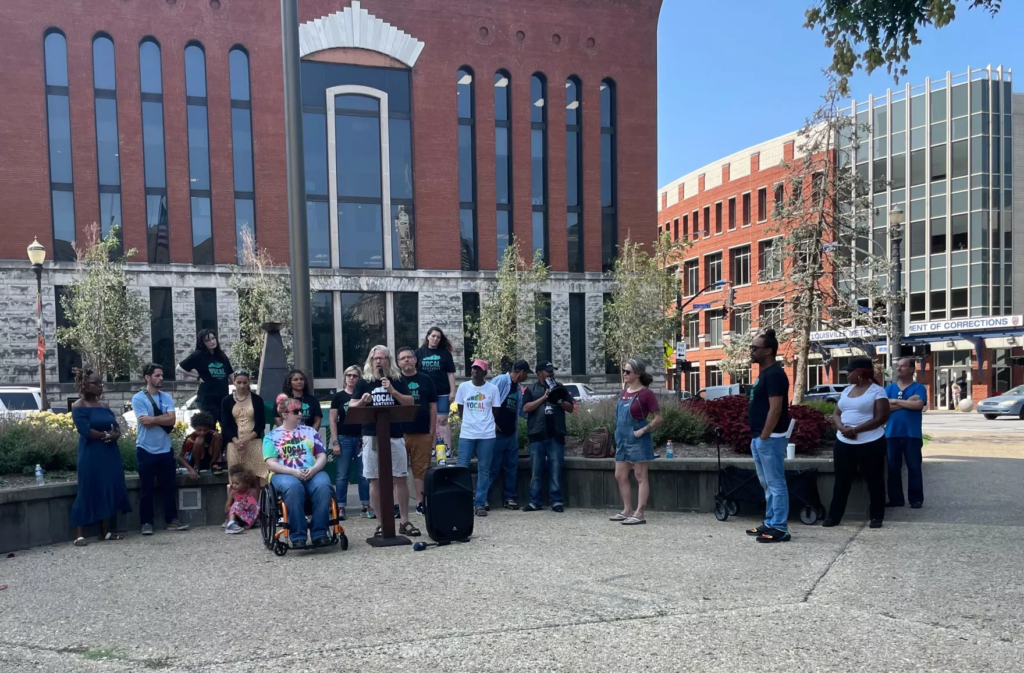Louisville Public Media
Published August 1, 2023 | 3:15 PM EDT

A year after VOCAL-KY unveiled its roadmap for Louisville Metro Government to end drug overdoses, the grassroots group called on local officials to take more action.
State data show over 500 people in Jefferson County died annually from a drug overdose between 2020 and 2022.
At a news conference Tuesday morning, VOCAL-KY director Shameka Parrish-Wright said the city must take immediate action to save more lives.
“Every drug overdose is preventable, and that’s what this is about,” she said. “We are about improving lives and saving lives so all Kentuckians can survive and thrive.
“We don’t want just Band-Aids. We want long-lasting approaches that can improve lives.”
Parrish-Wright and other members of VOCAL-KY, as well as a couple of other local organizations, highlighted the need for Louisville Metro Government to partner with them.
“I hope that the city will listen to us,” said Bella Schweizer, a leader with VOCAL-KY. “I hope that we can look forward to more along the lines of budget changes to support community-led programs. I hope that they will continue to work with us in cooperation.”
Also on Tuesday, VOCAL-KY released a new version of its roadmap to end overdoses. The group wants to see Louisville Mayor Craig Greenberg, who took office in January, and Metro Council members fully embrace the action plan.
The updated roadmap looks at the steps forward, and steps backward, that VOCAL-KY said the city has made over the past year.
Their list of positive actions includes:
- Expanding access to naloxone, a medication that can reverse an opioid overdose, within Louisville’s jail.
- Greenberg’s plan to eventually establish a “community care campus” in Smoketown, offering temporary housing and other services to people who lack shelter.
- Dedicating $1.5 million of the city’s first payout from settlements with companies that fueled the U.S. opioid crisis to local harm reduction and outreach services.
Despite the progress, VOCAL-KY said Louisville Metro officials have not meaningfully acted on their proposals. The group also criticized the city for repeatedly clearing out homeless encampments across Louisville.
Here are some of the VOCAL-KY roadmap’s recommendations:
- Expand Louisvillians’ access to naloxone and to medication-assisted treatment for substance use disorders.
- Allow community-based organizations and Louisville’s public health department to distribute kits that include tools people can use to take drugs in a safer way.
- Stop sweeping out homeless encampments and, instead, provide more emergency housing.
- Reduce the Louisville jail’s incarcerated population to under 1,000 people, in part by taking steps to stop criminalizing people for using drugs or lacking housing.
- Provide more access to medical care, including medication-assisted treatment, to people in the jail.
Although the roadmap speaks specifically to Louisville, Parrish-Wright said the recommendations can apply to and help other communities across Kentucky as well.
“This is an epidemic that has been cursing our state for a very long time. And so we want to be active and lift up the people and bring solutions that are brought to us by people who currently use drugs, people who are in recovery,” she said.
To bring more attention to this issue and the need to invest more in harm reduction, VOCAL-KY will host a rally and march on Aug. 31. That’s International Overdose Awareness Day.
The event starts that afternoon at 4 p.m. at Jefferson Square Park, also known as “Injustice Square.” Parrish-Wright said they’ll unveil an art project that honors those who’ve been lost to the United States’ “failed drug war.”
“We know that as administrations change, some of the priorities shift,” she said. “If we don’t keep lifting this up, the [Greenberg] administration can get bombarded by other issues.”
Parrish-Wright acknowledged there’s a wide range of issues that the city needs to address but said saving lives should always be the priority.
